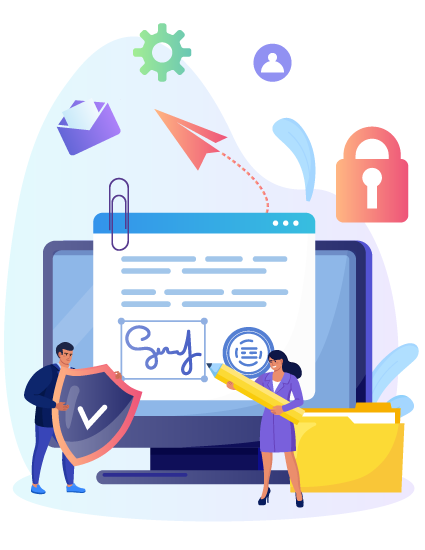Electronic Signature Software for Accounting Professionals
Build client signature requests into a streamlined workflow using MangoShare's eSignature software module.

With MangoShare, requesting client signatures is quick and simple
Verify signer identity with Knowledge-Based Authentication (“KBA”), capture a legally binding signature, and securely store completed documents —all with the click of a mouse.

What is an Electronic Signature or eSignature?
The Electronic Signature & Records Association (“ESRA”) defines an electronic signature as:
“an electronic sound, symbol or process that is attached to or logically associated with a record and executed or adopted by a person with the intent to sign the record.”
In layman’s terms, an electronic signature is a string of virtual fingerprints that are used to verify the identity of a signer and validate their intent to sign the document.
Why should I use an online electronic signature tool?
We are all familiar with the old-fashioned way of requesting client signatures: Print. Sign. Scan. Repeat. After all of the hard work preparing the required forms, this seemingly simple process can lead to agonizing delays.
With Mango’s eSignature services, you can get documents signed electronically by your clients at any time and from anywhere. You just upload the document, and your electronic signature request is delivered to your client to sign instantly.


Are electronic signatures legally binding?
The Uniform Electronic Transactions Act (“UETA”) and the Electronic Signature in Global and National Commerce Act (“ESIGN”) provide legal guidelines for ensuring the validity of electronic records and signed documents online.
Together, these pieces of legislation allow eSignatures to be recognized as legally binding if the following requirements are met:
- The signer’s identity can be confirmed or authenticated using a digital marker, like an IP address.
- The parameters of the transaction are communicated and the signer undeniably intended to undergo the method of signing.
- The signature associated with the document is verifiable and has evidentiary documentation.
Mango provides a digital audit trail that compiles the following unique identifying information so you can validate the identity of a signer and prevent tampering:
- IP addresses
- OS and browser information
- Geographic coordinates
- Time and date stamps
The Tools Your Clients Will Like and Use Run on Mango
Innovative file sharing and eSignatures management tools built for you and your clients
eSignatures FAQs
Still wondering how Mango can help you collect signatures with no hassle? We’ve got solutions that will take you far beyond industry-agnostic tools for collecting signatures in documents like Microsoft Word and Google Docs and keep your data secure.
Electronic signature programs work by leveraging an encrypted system that is based on a standard technological framework called the Public Key Infrastructure (PKI).
It’s important to remember that not all electronic signature software is created with the accounting industry in mind. Accounting firms should seek out eSignature tools designed for the unique needs of their industry.
Mango’s electronic signature software makes getting clients to sign on the dotted line with an eSignature as quick as a click, whether you’re sending electronic agreements to syncing client data to protecting sensitive information.
Many eSignature services provide static KBA methods that allow users to select security questions (like “What street did you grow up on?”) and provide answers that are stored by a company and accessed later, usually when a password needs to be retrieved or reset.
Dynamic KBA goes a step further by generating questions that apply only to the intended end user and do not require a previous relationship with the customer. These types of questions have also been called “out-of-wallet” as the content is generated from information within a person’s credit history or public records.
When it comes to electronic signature management, dynamic KBA is the preferred electronic signature option because of its increased security, ensuring that every document signed is secure.
Mango’s dynamic KBA enables users to access sensitive documents securely and save time by providing their legally binding signatures from any computer or mobile device with an internet connection.
With electronic signature software, the questions are generated from the user's credit history or public records. Many regulatory bodies, including the IRS, require that eSignature users be authenticated using dynamic KBA for signed documents.
The best eSignature software will provide you with the ability to create dynamic KBA authentication options (for example, with questions like "Which of these addresses do not represent somewhere you've lived?").
When choosing an eSignature program or using electronic signature apps, it’s essential to invest in technology that keeps you in line with local and federal regulations to avoid any legal issues and ensure that every document signed is legally binding.
Want to see how an eSignature can make the signing process at your accounting firm easier? Sign up for a free trial today without signing on the dotted line to pay a dime.
To qualify as an enforceable electronic signature, there must be evidence of the signer's intent to execute or accept the agreement.
With business eSignature software, digital signature services typically accomplish this by requiring the signer to take affirmative action, such as typing their name or drawing a digital signature using a mouse or touchscreen to send and sign documents for legally binding agreements.
While there are plenty of eSignature services out there, not all are created equal. Mango’s industry-specific eSignature program allows you to securely send unlimited signature requests so that your clients can easily sign documents and agreements and get them back to you with a click of a button.
While many practice management mobile apps don’t include eSignature programs, Mango’s electronic signature app allows you to request client signatures from anywhere at any time.
Mango removes the hassle of having to send editable PDF files or Microsoft Word documents back and forth to clients by providing you with engagement letter templates (complete with custom branding) that allow you to send essential electronic documents to multiple customers at once. This makes it easy to collect signatures and get the job done.
You can use Mango’s software to collect signatures for sensitive documents like:
- Engagement letters
- Commonly requested forms (e.g., 2848, 8879, 8821).
- NDAs
- Contractor agreements
While eSignature services like Acrobat sign, Zoho Sign, and other apps offer free plans with similar features to Mango’s eSignature software, none of them were designed with the specific needs of accounting firms in mind.
Mango offers a best-in-brand eSignature solution that lets you send unlimited signature requests with a level of security that ensures your client’s digital representation is safe with your firm when they’re signing sensitive documents.
If you’re still unsure of whether or not Mango beats out competitors like Acrobat Sign and others, see what we can do for your firm with a free trial, no credit card required.
An electronic signature is a digital form of a wet ink signature that is legally binding and secure. A digital signature is a secured signature that works with eSignature technology and relies on Public key infrastructure.
Today, electronic notarization of electronic signatures is legally authorized in all states by E-SIGN and/or UETA. However, as of October 2020, only 29 states had laws that empowered their notaries to conduct remote notarizations.
The states that have implemented Remote Online Notarization (“RON”) statutes are Alaska, Arizona, Colorado, Florida, Hawaii, Idaho, Indiana, Iowa, Kentucky, Louisiana, Maryland, Michigan, Minnesota, Missouri, Montana, Nebraska, Nevada, North Dakota, Ohio, Oklahoma, Pennsylvania, South Dakota, Tennessee, Texas, Utah, Vermont, Virginia, Washington, and Wisconsin.
When using an eSign online electronic signature service, it’s important to note that to qualify as an enforceable electronic signature, there must be evidence of the signer's intent to execute or accept the agreement.
This is typically accomplished by requiring the signer to take affirmative action for signing documents, such as ticking a box, typing their name, or drawing their signature.
While e-signing services like Acrobat Sign and other apps provide basic digital signing services, Mango provides an array of software solutions to take your operational processes to the next level.
Your accounting firm will benefit from:
- Document management tools that allow for the secure storage, organization, and sharing of documents
- Task and workflow management solutions that let you create automated workflows, track the progress of tasks, and ensure that deadlines are met
- Time tracking and billing to ensure your team is logging the correct time for billable hours and clients are billed correctly
- Secure client portals that allow you and your clients to securely access and create documents at any time, eliminating the need for less secure storage options like Google Drive
- Reporting and analytics with custom branding for clear insights into your firm’s progress so you can make data-driven decisions about your future
- Robust integrations with tools your firm already uses so that you don’t waste time switching from one app to another
- Enhanced security to keep sensitive client data safe and keep your firm in line with compliance standards
With all the features that Mango has to offer, your firm will have everything that it needs to create a path to success. Still not sure if Mango is right for you? Sign up for a free trial today.
We integrate with the tools that matter to your accounting firm













